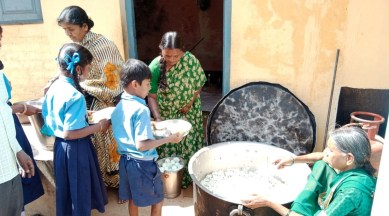In Karnataka, a state where distribution of eggs as part of the midday meal scheme was hotly contested by political and religious leaders, children have made their choice overwhelmingly clear. According to data accessed by The Indian Express, around 80 per cent of the midday meal beneficiaries have chosen eggs over the alternatives — bananas and chikki.
The data provided by the Department of Public Instruction reveal that as of December 14, of the 47.97 lakh students in government schools between Classes 1 and 8, 38.37 lakh students preferred eggs, 3.37 lakh chose bananas and 2.27 lakh preferred chikkis. The remaining children were absent during this period.
In July 2022, following a pilot study that saw encouraging results after eggs were included as part of the children’s diet, the state Department of School Education announced that besides hot cooked meals, children in Classes 1 to 8 could choose from eggs, bananas and chikkis under a supplementary nutrition programme. The order stated that the supplementary nutrition — as part of the Flexibility for Innovative Intervention activity under the PM Poshan Shakti Nirman (midday meal scheme) — would be provided for 46 days a year in all districts of the state for the current academic year 2022-23.
Of the 38.37 lakh students who chose eggs across the state, the majority, 15.67 lakh students, were from Belagavi division, followed by Bengaluru division (8.65 lakh), Kalaburgi division (8.33 lakh), and Mysuru division (5.70 lakh).
Talking to The Sunday Express, School Education minister BC Nagesh said, “We have extended eggs in midday meals across all districts to ensure that malnutrition should not impede education. Food is a debatable matter and everyone has their own views on it. However, on receiving positive feedback from the Kalyan-Karnataka region after the pilot was implemented, we decided to include eggs to fight malnutrition in other districts as well.”
Between December 2021 and March 2022, the Karnataka government had conducted a pilot study as part of which eggs were given under the midday-meal scheme in the socially and educationally backward Kalyan-Karnataka region that includes the districts of Bidar, Kalburgi, Ballari, Vijayanagara, Koppala, Raichur and Yadgiri.
However, the pilot study was met with stiff opposition from religious leaders and mutts who said that introducing eggs would end up in “discrimination” against students who are vegetarians. Lingayat seer Channabasavananda Swamiji was in December 2021 quoted as saying, “If eggs are given, schools will turn into military hotels. Instead, grains and pulses should be given. If the rule isn’t withdrawn, there will be severe protests.”
Story continues below this ad
Others, including from Swami Vachananand Guru, pontiff of the Harihara Panchamasali Mutt, said introducing eggs would “lead to problems as far as our religious rituals are concerned and children will go astray”.
Even the state’s position paper on the National Education Policy (NEP) 2020 had claimed that eggs and meat in midday meals in schools would cause “lifestyle disorders” and that 4 per cent of students are “unwilling” to consume eggs. The position paper was widely criticised by the scientific community.
Despite the Opposition, the government went ahead with the pilot study and, in July 22, decided to extend the scheme across the state.
While around 14.4 lakh students in Classes 1-8 in Ballari, Bidar, Kalaburagi, Koppal, Raichur, Vijayapura and Yadgir districts benefited from the pilot scheme, a 15-member team of food scientists, public health experts and economists from the Karnataka State Rural Development & Panchayat Raj University monitored changes in the mean height, weight and mean BMI of the two sets of children from two of these districts — Yadgir and Gadag.
Story continues below this ad
As part of the study conducted on 4,500 students in 60 schools in these two districts, the authorities served eggs (and bananas as an alternative) to students in Yadgir, while those in Gadag were given vegetarian meals with milk.
The study, earlier reported by The Indian Express, came up with “clear evidence of significant improvement” in the growth of children who were given eggs as part of midday meals, with girls in Class 8 gaining up to 71% more weight than their peers who were not served eggs. “This is a clear marker of improved weight gain among Yadgir school children, attributable to eggs and bananas,” the report says.
The Body Mass Index (BMI) of children, both boys and girls, improved due to the introduction of eggs, and to some extent bananas, states the study. The study also points out that bananas, for all their benefits, cannot be a substitute for eggs, and urges authorities to explore alternative “protein rich vegetarian items”.
Dr Sylvia Karpagam, public health specialist and researcher who specialises in the midday meal programme, said that while it’s “a welcome thing” that the distribution of eggs in government schools have been well received by students, the larger picture still needs to be addressed.
Story continues below this ad
“The budget for midday meals needs to be increased to extend the distribution of eggs to all days of the year; not just for 46 days, because a lot of students who attend government schools are Dalits, a and students from the lower rung of the society, who prefer eating eggs.”
A senior official from the Department of School Education said, “Students have responded positively to the distribution of eggs. However, factors such as budget and religious sensibilities become a challenge in expanding the programme. We haven’t been able to distribute eggs in government-aided schools supported by religious institutions. However, we have proposed to the state government to earmark funds for expanding the special nutrition food even to high school students (Classes 9 and 10) in order to address the malnutrition problem among older children.”
